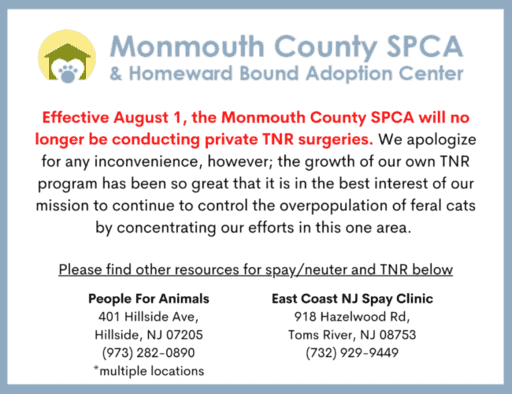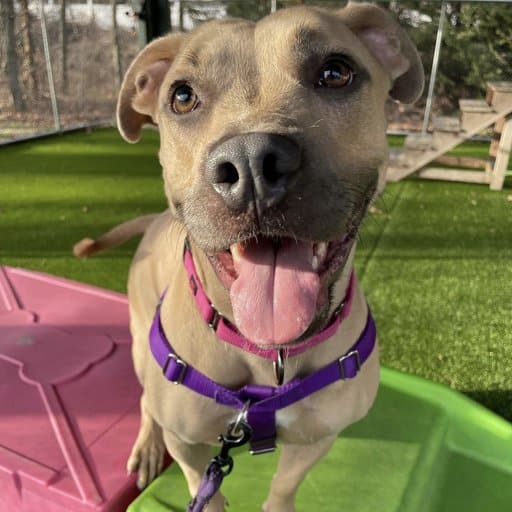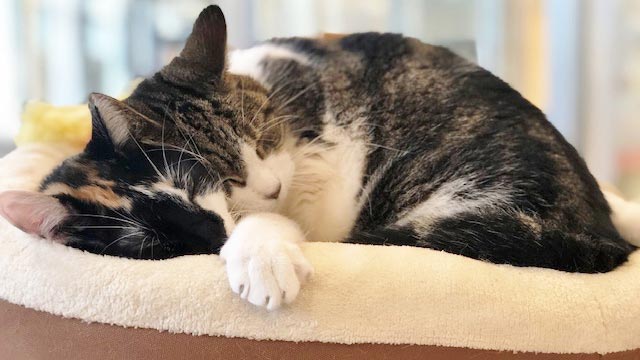Spay/Neuter

For anyone dropping their cats off for surgery: Carriers must be able to fit inside recovery room cubbies. Please make sure your carrier will fit in a space that is 25″ deep and 16″ wide. Thank you!
The Vogel Veterinary Care Center provides low-cost spaying and neutering for your pets.
We can offer this high quality care for your pet because our staff specializes in spay/neuter surgery. If any aspects of your pet’s health would increase surgical risks, you will be consulted.
After your pet awakens from surgery, he or she will spend time recovering while sleeping under a warm blanket.
Spaying and neutering your pet has significant health benefits and will help reduce the terrible overpopulation of pets that results in so many homeless animals in the shelter.
Have an appointment? Save time and fill out our spay/neuter forms beforehand!
Schedule an Appointment
Phone: 732-542-3125
Admission:
7:00AM – 7:30AM, Monday – Friday
Release:
2:00 – 2:30PM, Monday – Friday
Save time and fill out our spay/neuter forms beforehand!
Dogs
Male:
Less than 30 lbs – $295
30.1 – 60 lbs – $345
60.1 – 95 lbs – $405
More than 95 lbs – Call for availability
Female:
Less than 30 lbs – $375
30.1 – 60 lbs – $435
60.1 – 95 lbs – $515
More than 95 lbs – Call for availability
Cats
Female – $150
Male – $140
- The age of 12 weeks – 8 years old.
- Pets over six years of age will incur an additional fee to cover the cost of necessary pre-op blood work and extra medical equipment used.
- Dog price includes surgery, e-collar, post-op pain meds & 3 days of take-home meds. We accept most forms of payment: Cash, Credit Cards, CareCredit and Checks.
- Proof of current rabies vaccinations is required at intake. If no proof of rabies is provided, a vaccine must be given at the time of surgery for an additional $40 per vaccine.
The Importance of Spaying/Neutering Your Pet
There is a health care option that has proven cost-effective for years. Have your pet spayed or neutered. It is a wise investment in your pet’s health. You pay for this surgery only once, and it is available at low cost. When you have your pet altered, you treat them to a healthier, more comfortable life. As a result, you may save on veterinary costs as your pet grows older.
The Facts
You may wonder what the spay/neuter procedure involves and how it will affect your pet. When you know the facts, it is easy to see why spaying female pets and neutering male pets is a good idea.
Spaying and neutering are surgical procedures that prevent your pet from having puppies or kittens. The surgery is irreversible, safe and painless. Your pet is under an anesthetic throughout the operation. Your pet is monitored post-operatively and sent one the same day.
Age and health also play an important role in your pet’s recovery. Your pet will come home quickly and comfortably if he or she is healthy at the time of the operation. Physically mature pets can be spayed or neutered at almost any age, but younger pets heal more quickly. In fact, the best time to alter your pet is between six and eight months of age. Your veterinarian can help you decide when your pet is ready for surgery.
A common concern of some pet owners is that pets should be allowed to experience parenthood at least once. However, there is no evidence showing that house pets crave a “family of their own.” If you do choose to allow your pet to have a litter, consider whether you are prepared to pay the added expense of keeping the puppies or kittens. Spaying your pet before she has a litter saves you the trouble of finding homes for the litter mates and prevents many health problems for your pet.
High-Quality Care at a Low Cost
The Vogel Veterinary Care Center provides low-cost spaying and neutering for your pets. We can offer this high quality care for your pet because our staff specializes in spay/neuter surgery.
Since 1989 our licensed veterinarians have preformed spay/neuter surgery. In 1996, we opened a brand new facility, with two fully equipped operating rooms. Your pet receives a thorough examination to ensure that he/she is ready for surgery. If any aspects of your pet’s health would increase surgical risks, you will be consulted. After your pet awakens from surgery, he will spend time recovering while sleeping under a warm blanket.
The Benefits
Having your pet spayed or neutered is good for your pet, for you, and your community:
- You fight the animal overpopulation problem. Did you know that one stray cat can give birth to as many as 12 kittens in one year? Multiply that figure by just 10 strays in your community, and you will quickly see the problem increases.
- You give your pet a longer and healthier life. Most altered animals avoid contracting breast or prostate cancer and serious infections to the reproductive system. They are happier too, because spaying and neutering reduce the stress related to heat periods twice a year.
- If you own an unaltered pet, he is likely to receive injuries from fights or accidents that can occur when he searches for a mate. And you are likely to receive complaints from the neighbors if your unaltered pet prowls through their yards, attacks their pets or bites their children.
- You can save money. When you have your pet spayed or neutered, you are spared the emotional costs and the veterinary fees resulting from unwanted behaviors, such as fighting, spraying and roaming. You can save on tax dollars too. Your taxes and pet license fees are used to pay for animal control to rescue, shelter and feed stray animals. Spaying and neutering pets can reduce the number of unwanted pets in your community and can lower animal control expenses. And many towns offer reduced fees for pets who are altered.


